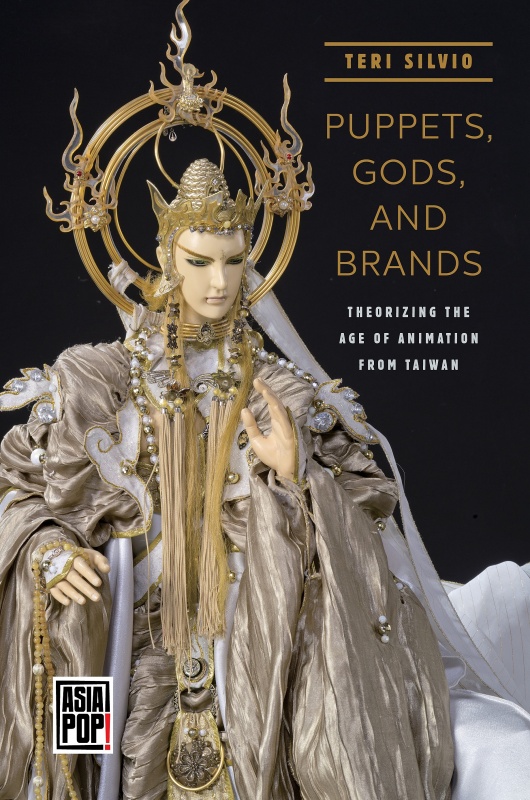Books: Puppets, Gods and Brands
October 21, 2019 · 0 comments
By Jonathan Clements.
 The latest book in the Asia Pop! Series, Teri Silvio’s Puppets, Gods and Brands, is a surprising, vivacious and convincing anthropology of animation, which places animation ideals and fannish philosophies at the very centre of modern times. For Silvio, the idea of imparting life into inanimate objects – of animating them – is not merely a concern for people making cartoons and puppet shows, but of anyone working in cybernetics and indeed in modern social media. People today are far more actively involved in animating their lives than they are in performing them, and that this is a function of the technologies we work with and watch.
The latest book in the Asia Pop! Series, Teri Silvio’s Puppets, Gods and Brands, is a surprising, vivacious and convincing anthropology of animation, which places animation ideals and fannish philosophies at the very centre of modern times. For Silvio, the idea of imparting life into inanimate objects – of animating them – is not merely a concern for people making cartoons and puppet shows, but of anyone working in cybernetics and indeed in modern social media. People today are far more actively involved in animating their lives than they are in performing them, and that this is a function of the technologies we work with and watch.
 This, she suggests, was always true – technology drove previous ideas about human society as well. Silvio argues, for example, that Erving Goffman’s ground-breaking observations in The Presentation of Self in Everyday Life (1959) were not, as one might assume, universal truths about human nature, but something specific to the mind-set of a generation coming to terms with the widening presence of television. She suggests that the human race is moving out of what was once the Age of Performance into an Age of Animation – with behaviours and attitudes that are closely related to theories of animation.
This, she suggests, was always true – technology drove previous ideas about human society as well. Silvio argues, for example, that Erving Goffman’s ground-breaking observations in The Presentation of Self in Everyday Life (1959) were not, as one might assume, universal truths about human nature, but something specific to the mind-set of a generation coming to terms with the widening presence of television. She suggests that the human race is moving out of what was once the Age of Performance into an Age of Animation – with behaviours and attitudes that are closely related to theories of animation.
Silvio’s confident opening preamble sets out her ideas linking animation and fandom firmly to previous notions of human behaviour, social interaction and religion. She is inspired to this by her experiences on Taiwan, an island suspended culturally at the intersection of Japanese, Chinese and American cultures, where in addition to local animation companies sub-contracting for the Japanese and struggling to make their own materials, the Pili corporation makes epic cycles of heroic fantasy, featuring kung fu puppets.
Intriguingly, Pili repeatedly stumble in their attempts to interest foreign buyers in their work. Despite a thrilling trailer and a Japanese distribution deal, their Story of the Sacred Stone was a flop. In a turnabout that ought to surprise absolutely nobody, an American re-dub under the title Wulin Warriors tried to turn everybody into “wisecracking teenagers.” A deliberate attempt at appealing overseas, The Arti, was ridiculed for being a pound-shop remake of Avatar.
Rescue came from an unexpected quarter, when the anime writer Gen Urobuchi fell in love with Pili puppet productions while at a Taiwanese comic convention, and eventually brokered a coproduction with his Nitroplus company. With Urobuchi, writer on such shows as PSYCHO-PASS and Madoka Magica, now on scripting duties, the resultant Thunderbolt Fantasy finally garnered Pili a wider audience. All of which is frankly a sideshow to Silvio’s own account of Pili productions, which is concerned less with the po-faced wuxia of a bunch of puppets, than with the avid fans of the shows, who cosplay as its heroes, re-enact its big moments, and treat copies of the lead puppets in much the same way as worshippers treat their idols.
This is where Silvio really comes into her own, detailing the parallels between the way that Taiwanese people treat their gods, and fans treat their favourite characters. There’s some fascinating stuff here about the sanctification of idols, which in Taiwan involves “dividing the incense” – sprinkling a little bit of the ash from the previous incarnation into the incense of the new. She relates the veneration of puppet heroes to the worship of Mazu, the Goddess of the Sea who is much beloved on Taiwan and throughout maritime China, and notes how elements of religious piety creep into Taiwanese fans’ valuation of official merchandise over knock-offs. She compares shelves of figurines to a devotee’s shrine, none of which will come as much of a surprise to many a fan, but the citations and connections she draws are richly contextualised and deeply anchored. She finishes off by putting her newly created toolkit to use talking about Axis Powers Hetalia fan communities, which seems at first to be an unexpected left-turn, but is soon related directly to her earlier chapters.
Miraculously, such seemingly disparate threads all braid together in Silvio’s book, a brilliant juggling act on a tightrope between anthropology and sociology, which manages to keep ideas in the air from soft power to difference feminism, nation branding and emotional labour. This could have all too easily gone very wrong, but Puppets, Gods and Brands will be welcomed by an entire generation of students trying to talk their supervisors into taking animation seriously.
Jonathan Clements is the author of Anime: A History. Puppets, Gods and Brands: Theorizing the Age of Animation from Taiwan is published by the University of Hawaii Press.
Leave a Reply